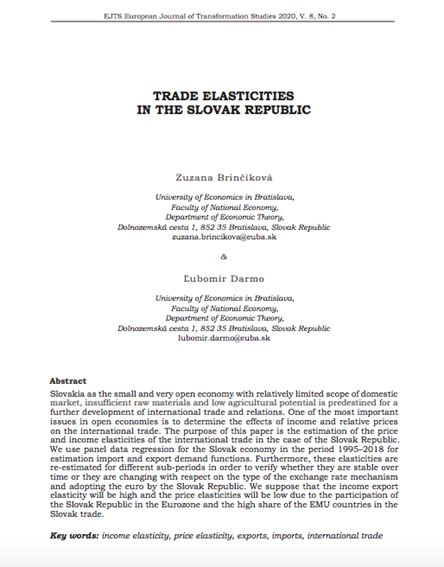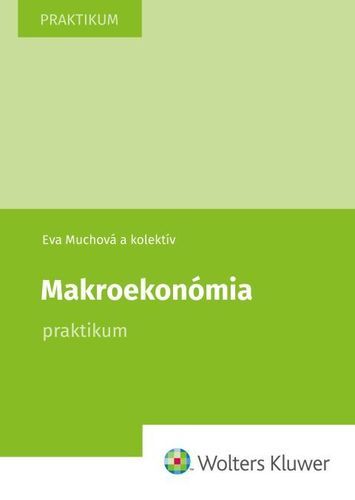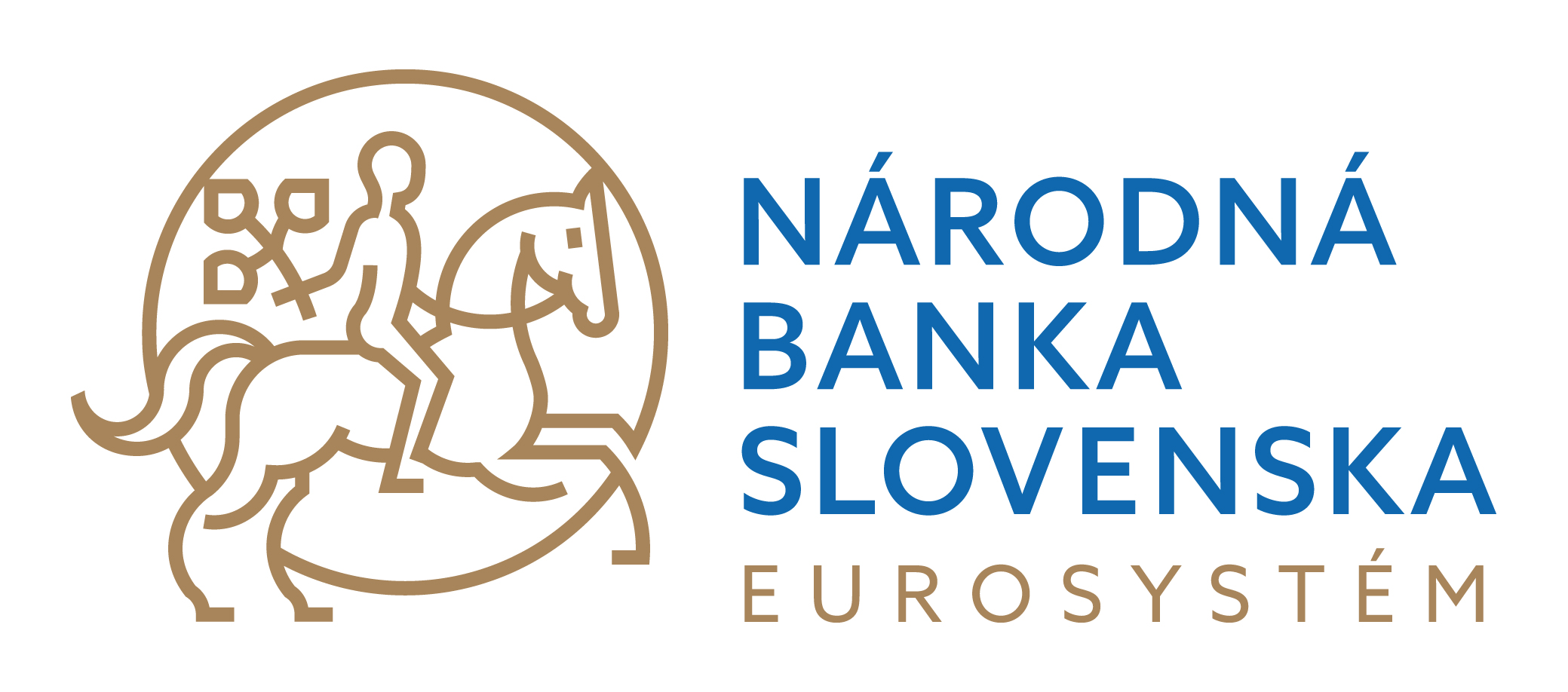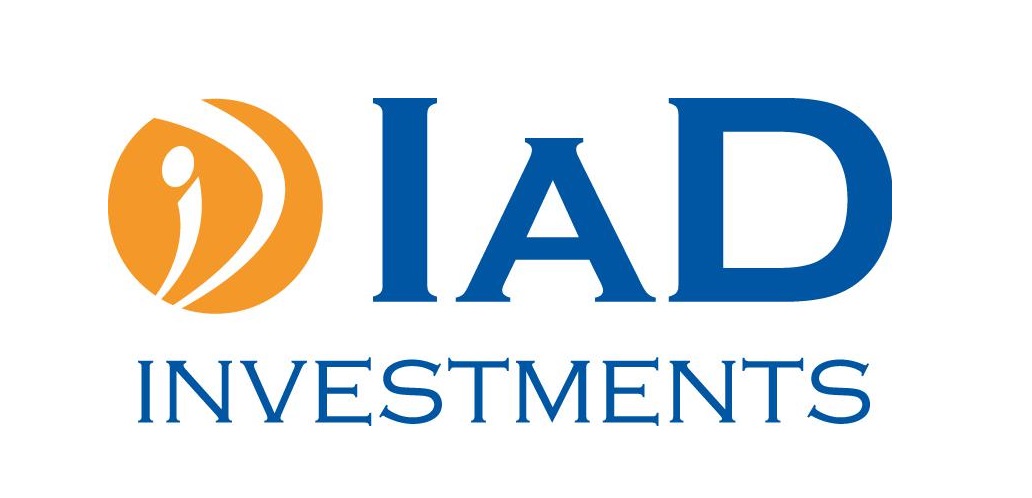Microeconomics - Practicum (2024)
A team of authors from the Department of Microeconomics has prepared a publication called Microeconomics - Practicum. The presented book is intended for students of the University of Economics in Bratislava, to whom it provides the opportunity to practice their knowledge of the basics of microeconomics. The publication deals with 13 basic topics that are taught in basic courses of microeconomics at faculties of economics, focusing primarily on the use of graphs and examples in economics.
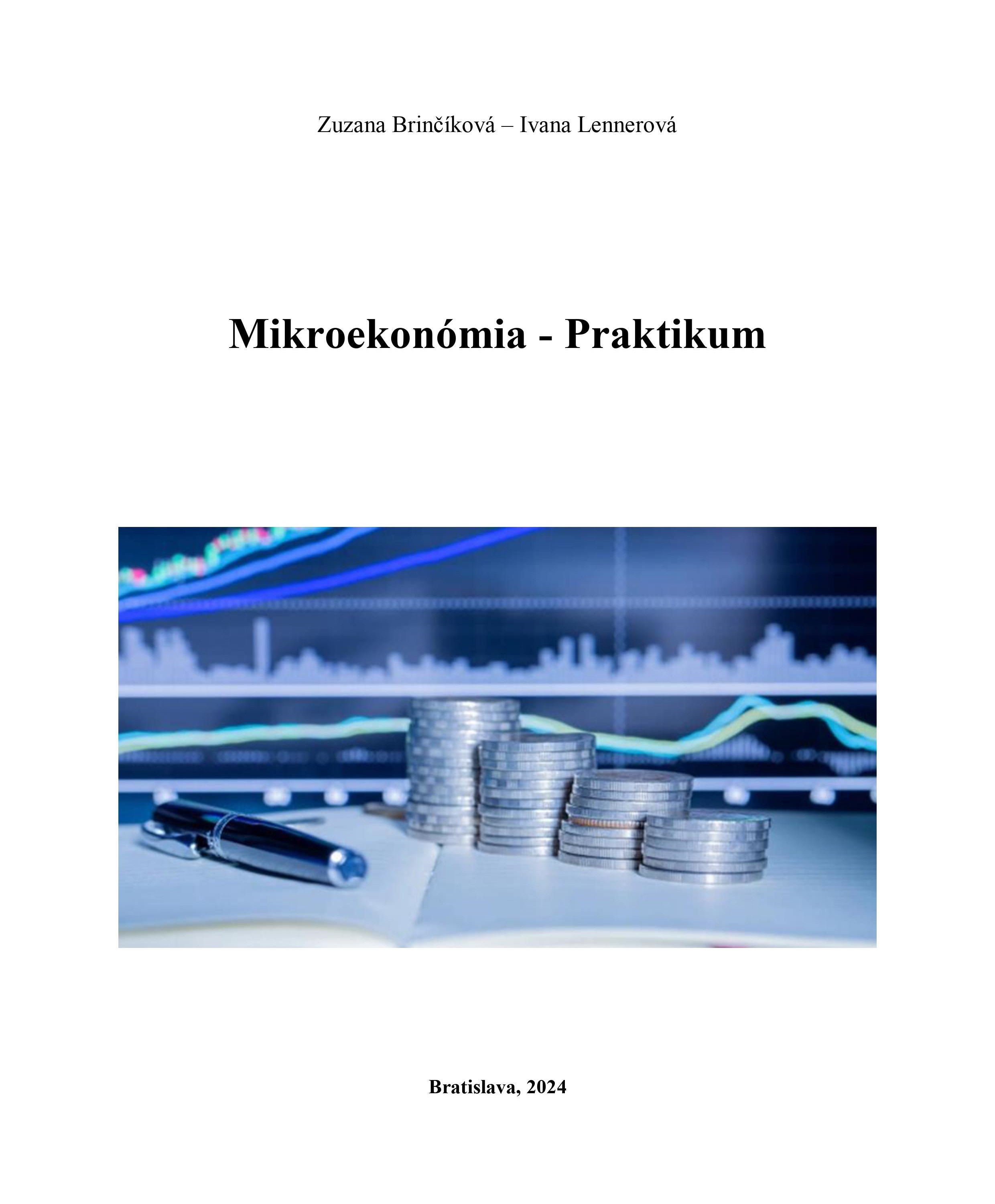
Macroeconomics (2024)
The textbook provides a comprehensive view of macroeconomics, which examines phenomena such as sustainable economic growth, inflation inertia, public debt, real interest rate, convergence or secular stagnation. All the main macroeconomic categories, concepts, models and macroeconomic policies are clearly explained in the publication. The reader will also learn more about the issue of macroeconomic equilibrium, inflation expectations, standard and unconventional monetary policy, the trilemma of macroeconomic policies, as well as behavioral macroeconomics as a new approach to macroeconomic analysis. The authors of the textbook encourage the reader to form opinions and the ability to apply the acquired knowledge. The textbook is intended primarily for students of the macroeconomics course at universities, but also for the general public.
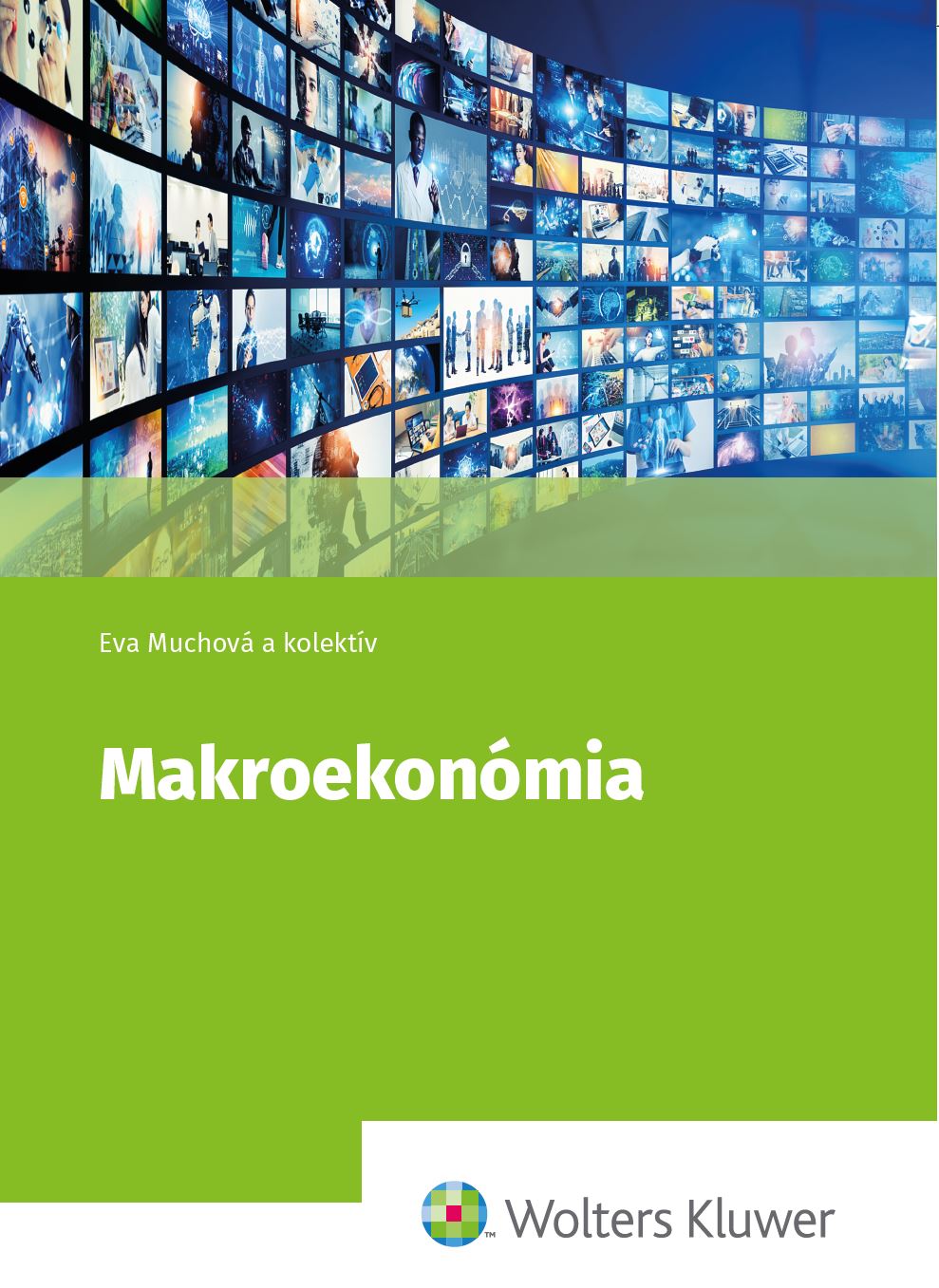
Economics (2022)
The publication provides an insight into the functioning of the market mechanism, as well as an overview of key microeconomic and macroeconomic approaches that will help the reader understand the functioning of market economies at the level of firms and households, as well as at the level of the economy as a whole. The publication also includes an explanation of the basic categories and knowledge of the macroeconomics of the open economy and integration processes from a theoretical point of view and in Europe. The text is based on the current state of knowledge and reflects current trends in the development of economic science and economic practice.
The publication is intended primarily as a textbook for basic economics courses at universities, but it will serve all those who want to gain systematic knowledge of this scientific discipline.
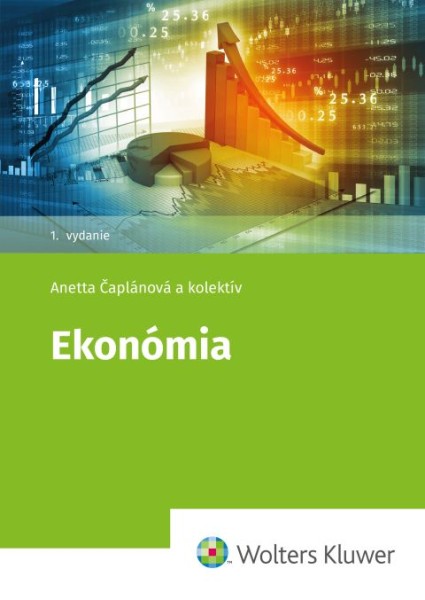
Economics - Practicum (2022)
The aim of the authors of the publication is to encourage students of economics courses to systematically prepare for seminars, independently develop economic tasks and think about various options for solving economic problems. To achieve these goals, the practicum contains numerical and graphic tasks, but especially tasks focused on a creative approach, i.e. logical tasks and tasks for thinking about economic phenomena with the necessary argumentation and justification of the expressed opinions. We believe that such an approach increases interest in economic science and thus contributes to the development of economic thinking.
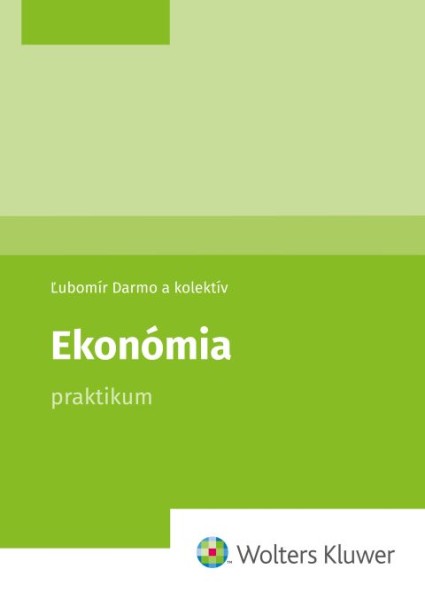
Pollution and environmental quality violations: Finding the right emission permit prices for NO2 EDPs (2022)
Prof. Ing. Anetta Čaplánová, PhD. co-authored an article entitled "Pollution and environmental quality violations: Finding the right emission permit prices for NO2 EDPs".
The article theoretically and empirically addresses the design of efficient trading of NO2 pollution permits. It is published in the journal Socio-Economic Planning Sciences, which is in Q1 according to Scimago and has an H-index of 52.
The article is available here: https://www.sciencedirect.com/science/article/pii/S0038012122000507?dgcid=coauthor
Business Cycle: Economic, Sociological and Behavioural Aspects (2021)
At the end of 2021, a team of authors from the department published a monograph published by a foreign publisher dedicated to the issues of the business cycle. The authors participated in its processing: Anetta Čaplánová, Eleonóra Matoušková, Zsolt Horbulák and Eva Sirakovová. Research on the issue of the business cycle in this publication does not remain only on a purely economic level. The authors expand the view of cyclical fluctuations in economic activity to include sociological, historical and psychological aspects. Special attention is paid to the starting points of behavioral economics for examining the cyclical development of economies. A special subject of interest of the authors are also the non-economic causes of economic crises, specifically pandemics and wars. The monograph is the output of the VEGA 1/0239/19 project "Implications of behavioral economics for streamlining the functioning of contemporary economies".
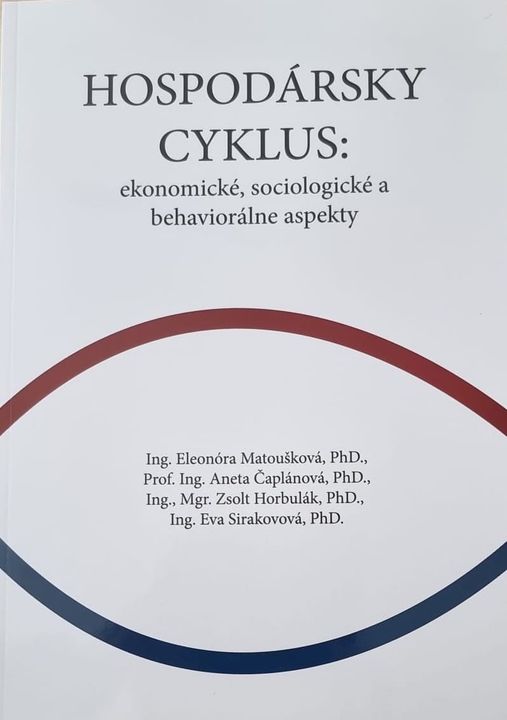
Project Publication Collaboration for Effective Digital Education (D-COLLAB) (2021)
As part of the implementation of the D-COLLAB project at the Department of Economics, the first publication entitled "Digital Education in the Era of Covid-19: Findings on the needs of university instructors and students" was issued.
The publication is focused on the methodological and technological aspects of digital education during the COVID-19 pandemic and is based on the analysis of the results of a survey among students and academics of the University of Economics in Bratislava regarding online teaching. Special attention is paid to students with special needs and the challenges they face during their online studies.
The publication is published in English and is freely available at the following link: http://d-collab.cs.ucy.ac.cy/wp-content/uploads/2021/11/D-CollabIO1final.pdf
You can learn more about the D-COLLAB project on the project page http://www.dcollab.eu/
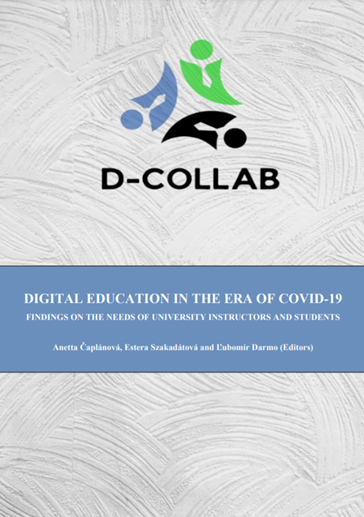
Macroeconomics - practicum (2021)
We present you an effective tool for practicing and understanding the subject of macroeconomics by the authors: Peter Leško, Marta Martincová, Eva Muchová and Karol Trnovský. A teaching aid consisting of 19 chapters, each containing theoretical background on the topic, basic concepts, examples and graphical analyses, reasoning tasks, assessing the veracity of statements, test questions and text supplementation. Students can compare their solutions to the tasks with the correct solutions and procedures that are listed at the end of each chapter. In terms of content, the textbook is compatible with the mainstream of macroeconomics, which is represented by relevant textbooks of macroeconomics, for example by N. G. Mankiw, O. Blanchard, P. Krugman or R. Holman. The teaching text is a practical tool for students when preparing for seminars and exams at home, but also for teachers when working on seminars.
An analysis of impact of personality traits and mindfulness on risk aversion of individual investors (2021)
If you are a woman, you should be more risk-averse, and if you meditate regularly, you should also be more risk-averse.
Did you know that emotionally stable people are significantly less risk-averse and open-minded people are more risk-averse? That older people and women are more risk-averse? These and other findings are brought by a new article authored by KET member Prof. Ing. Anetta Čaplánová, PhD., who, together with her colleague Vesarach Aumeboonsuke from the partner university NIDA Bangkok, Thailand, conducted original research aimed at analysing individuals' attitudes towards risk and financial decisions. Their original analysis of the impact of "mindfulness" on individuals' attitudes to risk deserves attention. The data obtained in this way allowed the authors to reach the above conclusions.
You can read more HERE:
https://link.springer.com/article/10.1007%2Fs12144-021-02015-9?fbclid=IwAR0Gb465h9SqpmHKTJhJI0XOOpwwyJ8wbA1PWCgLBNyp7kUNPCgv72sAWEA
The journal Current Psychology, in which the article was published, has an H-index of 41, is in Q2 according to Scimago and has an Impact factor of around 2.00. Congratulations!
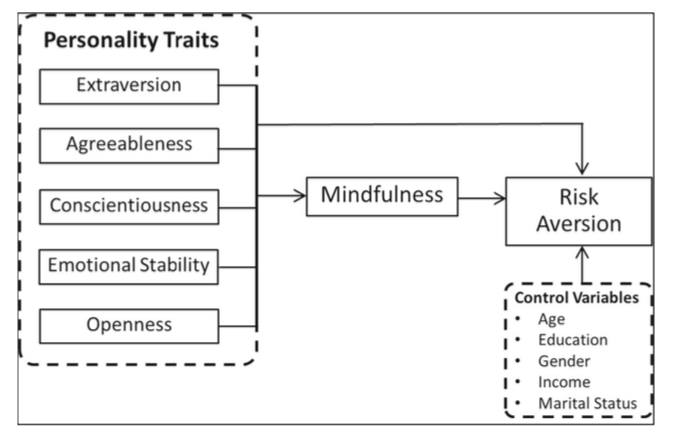
A dynamic model for a common market for emission allowances as a way to address persistent pollutant pollution (2021)
We would like to draw your attention to a new article published in co-authorship by our colleague - Prof. Ing. Anetta Čaplánová, PhD. In the article entitled "Dynamic Model of the Common Market with Emission Permits as a Way to Solve the Problem of Pollution by Persistent Substances" , the authors elaborate on a dynamic model of the common market for trading in emission permits for pollutants, which they propose as an alternative solution to the problem of persistent air pollutants. The authors of the article derive rules for pricing based on marginal costs and examine pricing in conditions of differently formulated restrictions. They also examine the functioning of the proposed market design on the basis of the simulations carried out. In particular, this contribution can help to address potential problems in the trading of emission allowances, e.g. breaches of regional environmental standards in different locations. The proposed approach also has the potential to significantly reduce transaction costs that normally occur in emissions trading.
The article is available here: https://polek.vse.cz/artkey/pol-202103-0001_dynamicky-model-spolocneho-trhu-s-emisnymi-povoleniami-ako-sp-sob-riesenia-problemu-znecistovania-perzistentnym.php?fbclid=IwAR0Gb465h9SqpmHKTJhJI0XOOpwwyJ8wbA1PWCgLBNyp7kUNPCgv72sAWEA
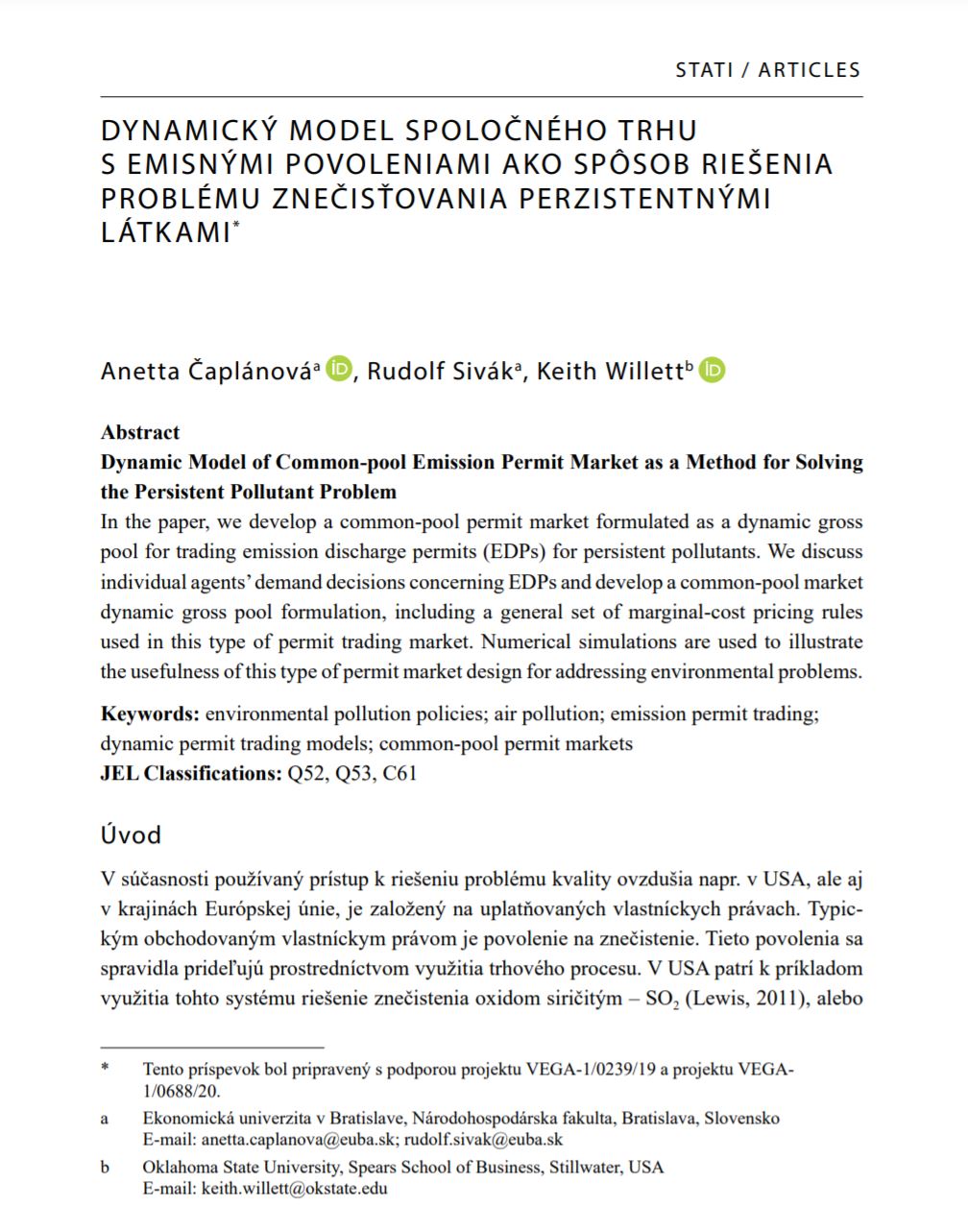
Institutional Trust and Compliance with Measures to Fight COVID-19 (2021)
We would like to draw your attention to a new publication co-authored by our colleague Prof. Čaplánová examining the impact of institutional factors on compliance with anti-epidemiological measures in connection with the COVID-19 pandemic, based on an analysis of data collected in Slovakia. The results confirm the importance of trust in key institutions for compliance with anti-pandemic measures.
The publication is available at the following link: http://link.springer.com/article/10.1007/s11294-021-09818-3
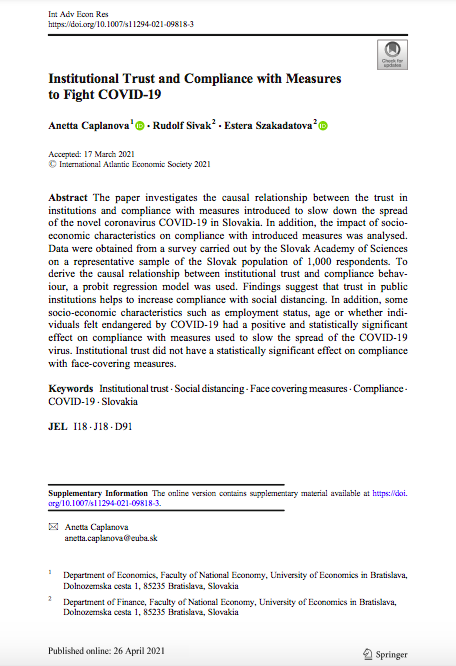
Principles of Economics (2021)
We would like to draw your attention to a new publication entitled Fundamentals of Economics, which was co-authored by our colleagues Prof. Ing. Eva Muchová, PhD, Ing. Ľubomír Darm, PhD. and Ing. Peter Leško, PhD.
The textbook is primarily intended for those interested in studying economics at universities, but it can also be useful as a repetition for economics students at faculties of economics. At the same time, the textbook is aimed at the general public who want to gain knowledge about basic concepts, relationships and contexts in economics. In the textbook, the reader will learn the answers to several questions, e.g. how to understand various turbulences in economic life; how consumers decide how much of their income to consume and how much to save; how a business sets prices and quantities of its products; how the government affects the economic development of the country; why cyclical developments occur in the economy; how the central bank can affect the inflation rate.
The publication is available at the following link: https://obchod.wolterskluwer.sk/sk/zaklady-ekonomie.p4955.html
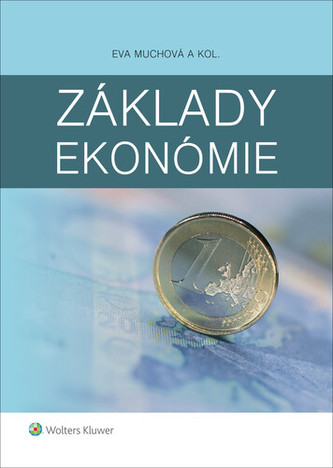
Financial Literacy Survey in the Slovak Republic (2021)
The team of authors of the Department of Economics consisting of Ing. Marcel Novák, PhD., Ing. Karol Trnovský, PhD. and Ing. Ľubomír Darmo, PhD. published a new article that examines the level of financial literacy in the Slovak Republic. The main objective of this article is to evaluate and compare the achieved level of financial literacy on a sample of the Slovak population (students of the Slovak University of Technology in Bratislava). The chi-square test was used to determine the relationship between different variables (gender, level of education and comparison of results with those from previous surveys), the correctness of respondents' answers to the questionnaire and to identify the level of financial literacy of university students without a specific economic background. The results of the research suggest that gender and educational level (bachelor's or master's degree) have no effect on the level of financial literacy of students. On the contrary, respondents in our survey achieved better financial literacy than respondents in the survey of the Slovak Banking Association.
The article is available at: https://cgscholar.com/bookstore/works/financial-literacy-survey-in-the-slovak-republic
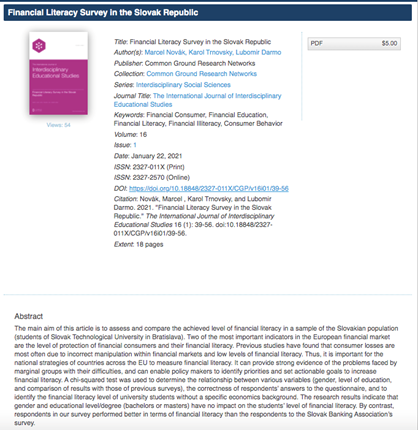
Agricultural commodity price dynamics and theirdeterminants: A comprehensive econometric approach (2020)
We would like to draw your attention to a new scientific article by RNDr. Jaroslava Hloušková, PhD. The article presents a complex system of models aimed at quantifying the reaction of agricultural commodity prices (specifically wheat, soybeans and corn) to changes in their potential determinants. Possible nonlinearities in commodity price dynamics over the business cycle are also taken into account. The results suggest that variables that represent market fundamentals and macroeconomic developments contain systematic predictive information for commodity price forecasts, and that agricultural commodity prices respond robustly to shocks in international competitiveness.
The full text of the article is available at: https://onlinelibrary.wiley.com/doi/epdf/10.1002/for.2768
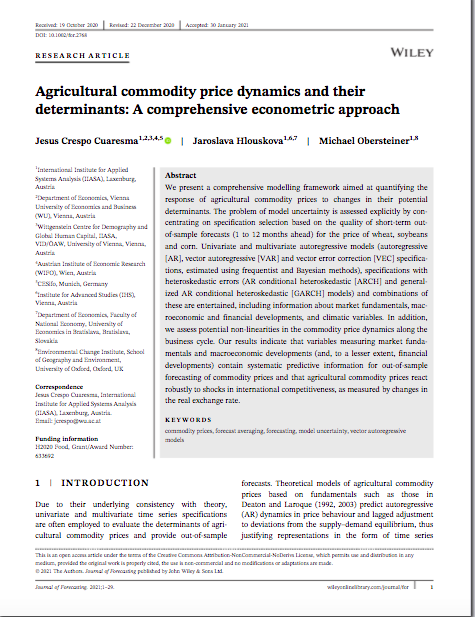
The relationship between foreign direct investment inflows and unemployment in the Slovak Republic (2020)
A team of authors from the Department of Economics – Ing. Ľubomír Darmo, PhD., Ing. Marcel Novák, PhD. and prof. Ing. Ján Lisý, PhD. published an article entitled "The Relationship Between Foreign Direct Investment Inflow and Unemployment in the Slovak Republic", in which they seek an answer to the question whether unemployment in the host country affects the inflow of foreign direct investment, or vice versa, the inflow of foreign direct investment has an impact on unemployment. The results suggest that the impulse is based on the unemployment rate, which in turn affects the inflow of investments into the Slovak Republic, but the duration of this effect is very short.
The full text of the article is available at: https://polek.vse.cz/pdfs/pol/2020/04/04.pdf
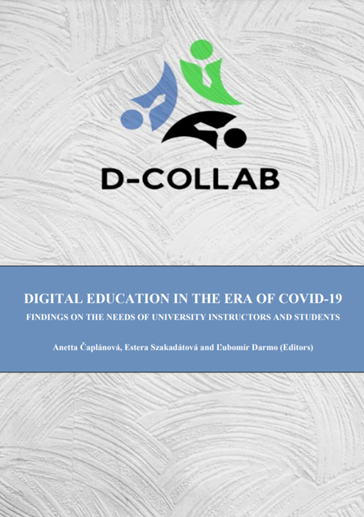
Determinants of the FDI Inflow into the Visegrad Countries (2020)
We would like to draw your attention to an article that was co-authored by our colleagues Ing. Ľubomír Darm, PhD. and Ing. Marcel Novák, PhD. investigating the determinants of FDI inflow to the Visegrad Group countries. FDI inflows are determined by many factors, which are sufficiently researched in publications and articles. However, the determinants of FDI inflows to the Visegrad Group (V4) countries have several specifics stemming from their transformation process. The article identifies specific determinants of the inflow of foreign direct investments into the V4 countries. The authors found that the size of the economy or its potential, labour productivity, corporate income tax, wages, unit labour costs, inflation, education of the workforce, openness of the economy, quality and development of infrastructure (represented by the density of the road and rail network), level of corruption and membership in the Economic and Monetary Union are factors that affect the level of inflow of foreign direct investment into the V4 countries.
The full article is available at: https://www.sav.sk/journals/uploads/1215135110%2020%20Darmo%20a%20kol%20-%20aut+SR.pdf
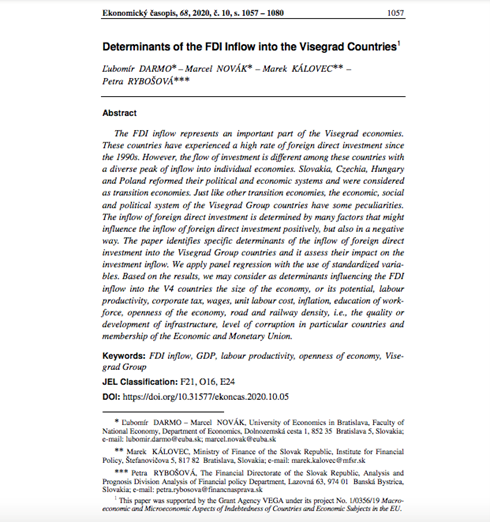
Trade Elasticities in the Slovak Republic (2020)
Article by Ing. Zuzana Brinčíková, PhD. and Ľubomír Darma, PhD. It examines the effects of income and relative prices on international trade. The basis of the research is an estimate of price and income elasticities of international trade in the case of the Slovak Republic for the period 1995 – 2018. Slovakia, as a small and very open economy with a relatively limited domestic market, insufficient raw materials and low agricultural potential, is destined for the further development of international trade and international relations. In the paper, the authors use panel data regression to estimate import and export demand functions, the elasticities of which are then examined over different time periods to identify whether they are stable over time or change with respect to the type of exchange rate mechanism.
The article is available at: https://journaltransformation.org/docs/EJTS_2020_8_2/13/EJTS_2020_vol_8_no_2_Trade_Elasticities_in_the_Slovak_Republic.pdf
